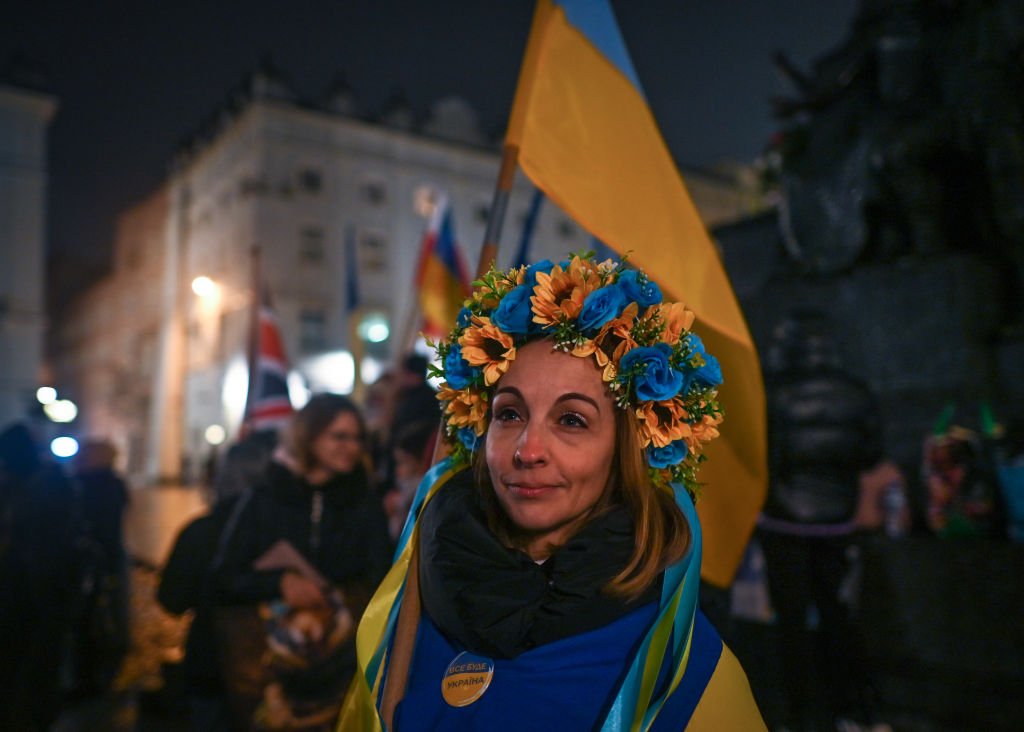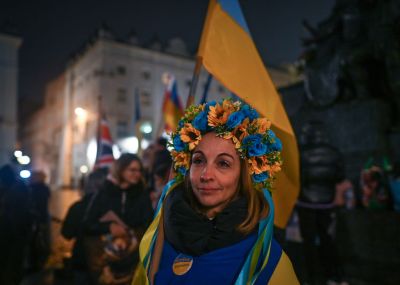In some ways, 2022 felt like the culmination of a decades-long turn toward autocracy around the world: The Russian Federation launched a major land war in Europe, the People’s Republic of China enforced draconian policies at home and lashed out abroad, and the Islamic Republic of Iran responded to protests with arrests, torture, and hangings. In the United States, former President Donald Trump—an illiberal populist if ever there was one—continued to hold sway over one of the two major parties. But as counterintuitive as it may seem, 2022 might have been this century’s best year for liberalism.
It did not start off that way. Vladimir Putin’s war on Ukraine threatened to wipe a democracy off the map. The core of Putinist ideology is that open societies are inherently weak because they lack harmony. But it wasn’t the supposed Ukrainian weakness that drove Putin to act. As several Russia experts have noted, the Russian leader escalated his eight-year war against Ukraine because Ukraine was becoming freer. Ukraine was growing more culturally liberal, had adopted anti-corruption laws, and was integrating further into the free world. Since the end of the Cold War, no president of Ukraine has been re-elected, proving the success of ballot box accountability. In 2021, Ukraine enacted an anti-oligarch policy that would have set the country on a better course if not for the war. Putin feared that the success of the world’s second-largest Slavic country would give the Russians across the border the “wrong” idea, threatening his rule.
After almost a year of fighting, Russia’s superior economy and military expenditure, as well as extreme cruelty, have failed to force the Ukrainian people into subjugation. Polls consistently show that Ukrainians support their government’s policy of defending Ukraine’s territorial integrity. Ukrainians had the option of a life under tyranny, but their choice has been to live free or die.
Iranians provided another encouraging sign. The Islamic Republic has spent two decades seeking to forcefully reassert its orthodox vision at a time when Iranian society has rapidly become more secular and liberal. The reform movement’s return to power in the 2010s and its subsequent failure to bring change left Iranians disillusioned about incremental evolution, sparking the first mass protests in the Islamic Republic’s history that called not for reform but for regime change. Those protests five years ago started a revolution that is now reaching its climax.
Like in Ukraine, death, torture, rape, and terror have not broken the will of the Iranian people. Quite the opposite. Those horrors have only strengthened Iranians’ will to reject dictatorship. Their chant, marg bar dictator, or “death to dictator,” is targeted not only at Supreme Leader Ali Khamenei. It is a statement of principle, better translated as “death to all dictators,” a phrase akin to sic semper tyrannis. Their aspirations, collected in the song “Baraye,” which has become the revolutionaries’ anthem, include ecological conservation, an embrace of the free market, and LGBT and women’s rights. We don’t know how many have already been killed, but their resolve lives on in protesters continuing to take to the streets despite the terrors they face.
China’s supposedly cowed population caught up in the waning months of the year. Protests against COVID lockdowns took on an anti-Communist Party character in some instances. Demonstrators in Shanghai, for example, called for Xi Jinping to step down. And while demonstrations were more often than not focused on the narrow question of “zero COVID,” they were nationwide, included participants from an array of socioeconomic classes and a variety of ages, and featured implicit, but undeniable, protests against the state’s human rights violations. Holding up blank pieces of white paper in lieu of protest signs, participants said nothing and everything all at once. Their rulers had failed them, so they stood up to shape their own destiny. In doing so, Chinese citizens contradicted Communist Party claims that its rule was not only no less legitimate than that of elected governments, but that it offered a superior way to organize society and address societal needs.
For all the talk about autocracy’s march, the world’s worst tyrants had the foundations of their regimes shaken last year, while the worst of election deniers in America lost—and all but one conceded their losses. The liberal world’s resolute and sustained support of Ukraine—despite the costs—is another encouraging sign. That democracies are choosing the righteous, but more difficult, path belies the notion that liberalism’s best days are in the past.
Back in 1989, Francis Fukuyama argued in his essay “The End of History?” that people were “witnessing not just the end of the Cold War,” but also “the end point of mankind’s ideological evolution and the universalization of Western liberal democracy as the final form of human government.” Critics often called into question or even ridiculed his thesis in recent decades as Vladimir Putin grabbed power more tightly, China grew richer even as the Communist Party maintained an iron grip on power, and many democracies saw domestic challenges to freedom. But 2022 proved Fukuyama right yet again. All things being equal, ultimate liberal triumph is as certain as anything in life could be.
Of course, all things aren’t equal, and the fates of societies depend on the decisions of political actors. As historian Robert Kagan notes, “The better idea doesn’t have to win just because it is a better idea. It requires great powers to champion it.” Liberals made a crucial mistake in the post-Cold War era: leaving democracy on autopilot, losing sight of how the enemies of freedom had been promoting autocracy. Due to the unsatisfying outcomes of the Afghanistan and the Iraq wars, not to mention the sacrifice of lives and treasure, many Americans came to believe that promoting democracy was either futile or, worse, counterproductive. Rather than questioning its methods, they came to question the entire project. Three administrations in a row have made little investment in democracy promotion. Meanwhile, autocrats haven’t stood idle.
Liberals had been losing what President Joe Biden calls “the battle between democracy and autocracies” because they were playing neither offense nor defense. The 2016 Russian (dis)information operation is well-known to Americans. But such operations have been commonplace throughout Europe and much of the developing world for much longer. Far worse is Russia’s financing of anti-liberal parties, some of which have formed governments in Europe. Iran has excelled in suppressing democratic movements and reversing progress in its region. It helped Hezbollah to transform Lebanon from a democracy into a party-state, funded militias to prevent functioning democratic governance in Iraq, and helped suppress Syria’s democratic revolution. Whether in Beijing’s backyard or further afield, China has worked to shore up autocrats, entrench corruption, interfere in local politics, and undermine the functioning of and faith in democratic institutions. In all cases, even when the United States recognized the problem—and it often hasn’t—Washington was outmatched in investment, monetary and otherwise.
And at home, democracies also got too comfortable. The election of Donald Trump, the rise of illiberal populists in Europe, the decline of political and religious freedoms in India, and endemic corruption in South Korea all demonstrate that even where liberalism has triumphed, it is not self-perpetuating. Americans, at least, may be experiencing what George Frisbie Hoar called “the sober second thought of the people.” That sober second thought provides an opportunity for democratic renewal at home—imperative not just for Americans’ own sake, but so that the city on a hill may dust itself off and shine once more.
Despite its many challenges, 2022 has perhaps been the best year for liberalism in a young century marked by setbacks. Events have yet again proven that the human heart’s desire for freedom is greater than for security and order—especially when it is the unelected and the dictatorial that define what it is to be secure. The dead and wounded in Ukraine and Iran, and the Chinese who risked their lives to challenge their oppressors, are our witnesses.
As the only creedal nation conceived in liberty, despite its many internal challenges, America is the last, best hope and foremost example from which freedom-loving peoples can draw inspiration. It is little surprise that it is to the United States that the oppressed first turn for assistance. They will take any help, but they carry English banners because that is what Americans speak.
America’s task in sustaining liberalism at home and advancing its reach abroad is never over, nor are the two separable. The first victims of America’s enemies are their own subjects who yearn for the blessings of citizenship—who yearn to live free and determine their own fates and the fates of their nations. And for that, they are the United States’ best allies against mutual adversaries. Taking their hands is not simply a moral imperative, but an American national interest.






Please note that we at The Dispatch hold ourselves, our work, and our commenters to a higher standard than other places on the internet. We welcome comments that foster genuine debate or discussion—including comments critical of us or our work—but responses that include ad hominem attacks on fellow Dispatch members or are intended to stoke fear and anger may be moderated.
With your membership, you only have the ability to comment on The Morning Dispatch articles. Consider upgrading to join the conversation everywhere.